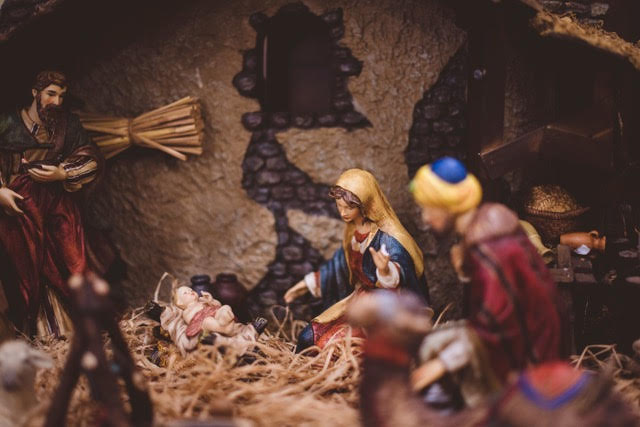An Unusual Invitation—Debunking Christmas…
…Finding the True Story Amidst All the Religious Fluff
by Philipp Meinecke
It’s Christmas season and, depending on your family’s traditions, you are probably in the midst of preparing for December 24 or 25 respectively. Cookies have been baked, the house has been decorated, candles have replaced regular LED lighting throughout the house, family pictures have been taken, ugly sweater contests have been won, and the debate on whether or not you should buy a “real” tree this year has probably also begun. Some place the first set of gifts under the tree already, and others wait until Christmas Eve.
Truth be told, this holiday season can get a bit confusing—my kids just walked throughout the woods celebrating St. Martin with lanterns while they were accompanied by the local fire department; just this past Wednesday this ominous figure Saint Nick showed up unannounced at the Kindergarten, at school, and then at our home, leaving the next sugar rush my kids really didn’t need—though this year, it came with tooth brushes. Christmas music can be heard on the radio, at home, and in our children’s mouths. The scent of orange peels mixed with crushed nuts fills the house with a holiday scent that is stronger than ever … Christmas stories are being watched, read, and listened to. There is excitement in the air.
Maybe you have a nativity scene. I just found my family’s traditional one last year when we cleaned out my aunt’s basement. It was a typical Bavarian one: a farm house, a wooden troth laid out with straw, baby Jesus (all white and barely covered—great parenting there), Mary, Joseph, three wise men, fully donned up in 16th century royal catholic garb, a few sheep (some missing a leg or two), a handful of shepherds, and the donkey and obligatory oxen. I have always wondered as to how crowded this scene had to have been. It’s a good thing the inn was occupied so that the large farmhouse became a viable alternative in order to provide the necessary meeting space. The songs we sing further deepen our “theological understanding” of the nativity and, thanks to the help of the Coca Cola man, the only thing that’s left—besides the question of where to house “cousin Eddy”—is deciding who brings the gifts: Santa or “das Christkind.”
With all the glitter, the traditions and holiday preparations, the story of Christmas itself can get a bit muddled. In fact, I find it difficult to read any text in Scripture that deals with the birth of Christ without my preconceived notions. I have a set of lenses through which I view the text—lenses of tradition, childhood memories, folklore, cultural mores, and ingenious marketing ploys that aim at selling me their version of Christmas, and so do you. It’s difficult, not to read things into the text or to simply let the text inform our beliefs and our actions. With this in mind, I’d like to invite you to turn with me in your Bibles to Matthew 2:1-12. I want speak on the subject “An unusual invitation—debunking Christmas: finding the true story amidst all the religious fluff.” As you find your place, let me pray.
If there is one truth I want you to walk away with today, it is this:
Christmas is God’s invitation to you and me to come and see the King and leave changed.
It’s an invitation to come and see … (vv.1-8).
1Now after Jesus was born in Bethlehem of Judea in the days of Herod the king, magi from the east arrived in Jerusalem, saying, 2 “Where is He who has been born King of the Jews? For we saw His star in the east and have come to worship Him.” 3 When Herod the king heard this, he was troubled, and all Jerusalem with him. 4 Gathering together all the chief priests and scribes of the people, he inquired of them where the Messiah was to be born. 5 They said to him, “In Bethlehem of Judea; for this is what has been written by the prophet:
6 ‘And you, Bethlehem, land of Judah,
Are by no means least among the leaders of Judah;
For out of you shall come forth a Ruler
Who will shepherd My people Israel.’”
7 Then Herod secretly called the magi and determined from them the exact time the star appeared. 8 And he sent them to Bethlehem and said, “Go and search carefully for the Child; and when you have found Him, report to me, so that I too may come and worship Him.” (Matthew 2:1-8, NASB)
When you read Matthew 2, it’s easy to miss the references to time that have been in our text all along. In the context, we read that the events we will be looking at happened…
- … after Jesus was born in Bethlehem (v.1)
- … in the days of Herod the king (v.1)
- … and before Herod decreed all male children two years and younger to be killed (v.16)
In other words, there has been some time that has passed between Jesus’ birth, the shepherd’s arrival, and the events we want to look at today. The days of purification were over and Jesus’ circumcision had already taken place (Luke 2:21,39). Simeon had a chance to see Christ before his death (Luke 2:25-35) and Anna, the prophetess, also had a chance to see him (Luke 2:36-38). Joseph, Mary, and Jesus no longer were in that place where he was born, but now were in a house in Bethlehem (v.11).
While our text isn’t specific as to his exact age, we know Jesus couldn’t have been more than two years of age (v.16), and definitely was not a new-born baby anymore. Already, your nativity scene should get cleared out a bit. Joseph isn’t mentioned, so the picture is that of Mary, Jesus, and the magi meeting up at a house in Bethlehem (v.11).
It’s an invitation for the magi to come (Matthew 2:1-2).
This is where the story gets interesting. There was already a king of the Jews reigning in Jerusalem: King Herod – albeit he was a “puppet king” left in Judea by the Romans to govern an otherwise occupied territory. And yet, here arrive a few magi “from the east” at Jerusalem and they begin asking questions. Clearly, the people in the city would be able to give them more information than what they already had. What information did they have? Our text says that they were looking for “him, who has been born King of the Jews” (v.2). So, the story begins in the streets of Jerusalem and then eventually leads to the palace of King Herod. The phrase, “born King of the Jews” is very interesting in that Herod’s kingship was not one inherited by birth; rather, he was appointed king by the Roman senate. As a descendant of Esau, he had no rightful claim to the throne of David and the only reason he happened to sit on it was due to the fact that the ones in charge of the entire region put him there.
Put yourself into this situation. Now there is a group of magi – we are not told how many—who arrive at Jerusalem and are looking for the “born King of the Jews.” What’s more, the magi saw “his star”—the star that could only belong to this king—in the east and they have taken a long journey to come to Jerusalem and worship him.
A lot of what we have come to believe about the magi has been conjecture at best and outright religious folklore at worst. Nowhere in Scripture are we given an exact number of the magi, and historians are divided on whether it was three or fourteen (Chrysostomon). We are also not given their names—Caspar, Melchior, and Balthazar were added later by tradition or legend.
According to Matthew’s account, their number is irrelevant, their names are irrelevant and so is the exact place where they had come from. Our text simply says that they came from the east and that they were magi – astrologers and philosophers and not kings as has been falsely assumed. They saw a peculiar star in he east and they decided – for whatever reason – to follow it. What’s more: these astrologers associated this one star with the birth of a king – not any king – but specifically the king of the Jews. And they took a long and treacherous journey to come and see him and to worship him.
For whatever reason – we are not told why – they follow something they call a star – though it behaves nothing like it as it moves from a static fixture visible from the east to a moving object that moves from Jerusalem into the direction they came from and rests on top of a house in Bethlehem; they associate the star with a person, and know just the one thing to do: worship. This is not the mere paying of respects to a king out of courtesy, fear, or general well-meaning; no, the word literally means “prostrating oneself and worship.” It’s almost as if God extended a special invitation through some portion of his creation to come … and worship. But the magi were not the only ones to whom the invitation was extended: now they arrive in Jerusalem and an…
Invitation for the people of Jerusalem is given to come (Matthew 2:3).
Some of the people of Jerusalem met the magi first-hand. They heard their inquiry and you can be sure word spread quickly from there. But instead of responding to the news with joy, as one would expect, the people were “troubled” along with king Herod, who had heard of it. We could speculate about why they didn’t rejoice and allowed the news of a new-born king of the Jews – who is not Herod – to take away their calmness of mind. Still, what’s puzzling is that they didn’t at least go out and “see” the child. It’s a two-hour walk just to see. The invitation was there, but the people didn’t go.
It’s an invitation for Herod to come (Matthew 2:3,7-9).
As you go through the text, it is amazing how many opportunities Herod had to follow God’s invitation to come and see:
- In verse 3, he heard about the magi’s inquiry.
- In verses 4-7, he went on a fact-finding mission and is given ample reasons to go and check out – not just a king, but Messiah.
- In verse 8, he sent the magi to Bethlehem while he remained back in Jerusalem.
Herod didn’t want to worship the Messiah-King – he was troubled. Again we could speculate, but knowing Herod’s constant fear of losing power – and him sitting on a throne that – in all likelihood – belonged to this baby, the last thing he wanted to do was to worship. In fact, verse 16 tells us, he wanted to kill the Messiah-King instead. Herod was given an invitation, but he didn’t come and see.
It’s an invitation for the religious elite to come (Matthew 2:4-6).
The chief priests and scribes were tasked to look into the magis’ inquiry and they not only found the connection between a King that was to be born and Messiah, but also the exact timing that syncs up with the point of time when the magi first saw the star, as well as the exact Old Testament prophecy (in Micah 5) that matches with the location of said Messiah-King: Bethlehem. There were too many points coming together for this to be mere coincidence. The invitation was clearly spelled out for them to come and see. Yet, they too did not go.
I don’t want you to miss this: The invitation then and now was and is the same: come and see the King.
The invitation is for unbelievers, who may have nothing more to go on than maybe “God’s invisible attributes, His eternal power and divine nature, have been clearly seen, being understood through what has been made, so that they are without excuse,” according to Romans 1:20.
The invitation is for the noble, rulers, kings and those in authority, if they are willing to set aside their quest for power and control and at least look into the possibility of one greater than them.
The invitation is for the religious – those who have access to the written word of God, those who have every opportunity to know God and understand His ways and plans for mankind. Those who are already engaged in religious activity that may at least expose them to the truths of God’s word amidst traditions and folklore.
The invitation is for the nameless crowds – those who may or may not have had any access or information about God’s plan for them.
The invitation is for keepers of overcrowded inns and the social outcasts who tended the sheep. It’s for those in charge, and those who have no charge at all. It’s for the religious and the irreligious. It’s for those far and near.
The significance of Christmas is not measured by the size and/or accuracy of the nativity scene – our text makes that abundantly clear; rather, it is measured by the extent of the invitation that God has given to humanity: come and see.
Christmas is God’s invitation to you and me to come and see the King and leave changed.
It’s an invitation to come and see the King… (vv.9-11).
9 After hearing the king, they went their way; and the star, which they had seen in the east, went on before them until it came and stood over the place where the Child was. 10 When they saw the star, they rejoiced exceedingly with great joy. 11 After coming into the house they saw the Child with Mary His mother; and they fell to the ground and worshiped Him. Then, opening their treasures, they presented to Him gifts of gold, frankincense, and myrrh.
After the magi received further insight as to who to look for and where to find him – that is, Messiah: Savior, Redeemer and in Bethlehem: the house of bread where the bread of life was to be found – they notice the star moving and leading the way to the exact place where he was staying.
They were overjoyed – our text bubbles with superlatives to express what they felt – as they saw the star leading the way. They came to see a king; but they are about to meet Messiah. It’s funny how that works many times: you come to Jesus – for whatever reason – and then find, there’s so much more that you discover once you go to see him. But you have to come.
Now, notice the progression of things once they go into the house:
They saw Jesus
- They fell to the ground
- They worshiped him
- They opened their treasures and offered Him gifts
The magi didn’t see Jesus as a helpless babe – they saw him for who he was:
- The King of the Jews
- Messiah who was promised long ago but now has come
Their response is more than what customs would expect when you meet a dignitary. They fell to the ground and worshiped him – that is the only response in Christ’s presence when once you have personally recognized who He is, what authority He holds, and what hangs in the balance for you. Scripture is replete with stories of people recognizing Christ for who he is and the response is always the same: falling to the ground and worshiping him.
This Christmas don’t just celebrate a baby’s birthday – worship him with the fear, reverence, and the respect and adoration he deserves. Don’t be content with a baby in a crib – recognize him as King and Messiah: the promised one sent to save you, the King who deserves and demands your worship.
The magi didn’t just empty out their pockets or brought in small trinkets – no, out of their treasuries they brought their gifts befitting a King: gold, frankincense, and myrrh. They gave their best – holding nothing back. They thought this through beforehand – and they didn’t vacillate to offer it up.
In Romans 12:1-3, Paul, after sufficiently describing humanity’s desperate need for God’s intervention, God’s solution to humanity’s core problem, and the length to which he went to see it through, he offers but one reasonable response “to present your bodies a living and holy sacrifice, acceptable to God, which is your spiritual service of worship.” When you come and see the King – there’s but one response when you meet him: worship. Worship him with your gifts. Worship him with your talents. Worship him with your life. That is your reasonable form of worship.
Christmas is God’s invitation to you and me to come and see the King and leave changed.
Finally,
It’s an invitation to come and see the King and leave changed (v.12).
Our text says, “And having been warned by God in a dream not to return to Herod, the magi left for their own country by another way.” I find interesting to note the different ways in which God chose to communicate to the magi in our passage alone:
- He used creation (vv. 2,10)
- He used Scripture (vv.5-6)
- He used people of insight (vv. 4-6)
- He used circumstance (vv. 1-3,11)
- He used dreams (v.12)
God is not limited in his ability to communicate to people, whose hearts are willing to hear. Maybe the magi had access to Jewish writings left there from Daniel’s time – we are not told. Maybe God communicated truth with them in some other form to stir their hearts to go – we are not told, either. However, what we are told is that God has found a way to get their attention, to reveal truth as they went, to confirm it through His word and lead them straight to the feet of Jesus. That is where the journey must end: at the feet of the one who is “the way, the truth, and the life”, because there is no other way to the Father but through him.
After seeing and worshipping King-Messiah, God communicated through a dream not to return to Herod. So they went back home another way.
I don’t want to over-spiritualize this but I also don’t want to downplay the significance, either. They came, they saw, they worshiped, they left differently. They left a different way physically and they left in a different way spiritually. Now they have seen the born king of the Jews, whose star they had followed. What’s more, they have seen Messiah – not just a baby “wrapped in swaddling clothes” – but one, whose arrival alone divides humanity in two camps: those who have been invited but stay away troubled and those who have been invited, come and leave changed.
Christmas is God’s invitation to you and me to come and see the King and leave changed.
This Christmas is God’s invitation to you – as it has been for over 2,000 years: come and see the King. Come with what you know. Come with your doubts. Come with your expectations. Come with your concerns. Come with your hesitations. Come with gifts or empty-handed as the shepherds did. But come.
And then, see. Don’t just see a baby in a troth. Don’t get hung up on a star. Don’t get sucked into folklore or tradition. See the king. See Messiah. See the baby as the one who was promised and sent – for you.
Respond in worship. God invites you to worship the King; God invites you to worship Messiah. Fall on the ground – worship.
Offer him what you have. Your gifts, your talents, your treasures. Bring your dreams too, as well as your hopes, your wishes, your desires and offer them up. At the very least offer your life – not once, but everyday. That’s the only thing that makes sense.
Finally, leave changed. Don’t go back to your old ways. But take what you have found in Christ – your king and your Messiah – back to your circle of influence: your family, your friends, your co-workers.
Photo credit: Ben White on Unsplash







